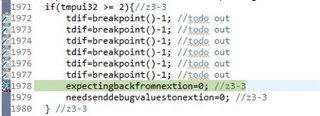I think i am going stir crazy...
How is it possible that this breakpoint gets triggered when the IF condition is not met (all variables are defined globally as uint32_t)?

This thread has been locked.
If you have a related question, please click the "Ask a related question" button in the top right corner. The newly created question will be automatically linked to this question.
I think i am going stir crazy...
How is it possible that this breakpoint gets triggered when the IF condition is not met (all variables are defined globally as uint32_t)?

It turned out that I recently had to increase my optimization level for the compiled program to fit into my available memory.
At the higher optimization level it appears that not all cases of being 'allowed' to set a breakpoint on a line of code results in the code actually breaking at that point in the code (WOW).
I figured this out by putting a breakpoint well AFTER the IF statement and then upon breaking at this second breakpoint it was obvious that the two variables that were set to 0 inside my subject IF statement were in fact NOT set to zero, so the execution never really entered that IF condition.
Does anyone know of a line of code that can be placed anywhere in my code that will GUARANTEE a breakpoint can be set on that line AND that if the breakpoint triggers on that line, code execution is REALLY there (not just 'showing' as broken there and NOT really being broken there, as in my case :) ) ?
This is not definitive, but this code below works to get me a breakpoint that actually breaks when the condition is met:

The function breakpoint() simple returns tdif+1 so the 6 added lines do not change the value of tdif.
Only one tdif=breakpoint()-1; line did not work to get a REAL breakpoint, so I tried 6 of them and it worked, I have no more time to isolate this solution.
EDIT: I just found another way to have the code break properly there.
I put a 'write' 'hardware watchpoint' on the variable 'expectingbackfromnextion'.
I can shed some light on what probably happened. Consider this contrived example ...
int fxn(int arg)
{
if (arg)
{
return 10;
}
else
{
return 20;
}
}
I use the TI ARM compiler to build it. But, for the purposes of this example, that detail doesn't matter much. Other compilers can generate similar code. Here is the assembly code generated in this case ...
fxn:
;* --------------------------------------------------------------------------*
CMP A1, #0 ; [DPU_V7M3_PIPE] |5|
ITE NE ; [DPU_V7M3_PIPE]
MOVNE A1, #10 ; [DPU_V7M3_PIPE] |5|
MOVEQ A1, #20 ; [DPU_V7M3_PIPE] |5|
BX LR ; [DPU_V7M3_PIPE]
Because of how the IT instruction is used, there are no conditional branches in this code. All of those instructions execute. Based on the value of arg that is passed in, one of the MOV instructions has no effect. Suppose you set a breakpoint on one of the return statements. You'll hit it. But the condition related to that return may not be active at that particular moment.
This is an example of how optimization can cause debugging to be difficult. For more on this issue, please see the article Debug versus Optimization Tradeoff.
Does anyone know of a line of code that can be placed anywhere in my code that will GUARANTEE a breakpoint can be set on that line AND that if the breakpoint triggers on that line, code execution is REALLY there
A guarantee? No. But I can make a suggestion that will work often enough it is worth trying. Add asm statements that execute a nop ...
int fxn(int arg)
{
if (arg)
{
asm(" nop");
return 10;
}
else
{
asm(" nop");
return 20;
}
}
Generally speaking, asm statements are to be avoided. I presume you will use them only on a temporary basis, as a way to aid debugging. In that case, I suppose asm statements are OK. The generated code performs the branches you expect. You can set breakpoints on the asm statements. That's how it will work out a lot of the time. But no one can guarantee it always works.
I put a 'write' 'hardware watchpoint' on the variable 'expectingbackfromnextion'.
I think that is a better solution than using asm statements. That said, it is good to know about multiple methods.
Thanks and regards,
-George
Add asm statements that execute a nop ...
GREAT!! I think this will be the first breakpoint weapon that I deploy from my new breakpoint arsenal when I will be withdrawing them after my debugging war.
Thanks,